What Diet is Best for Seniors?
One of the most common concerns for seniors is maintaining a healthy diet that can support their changing nutritional needs. As we age, our bodies undergo significant transformations, such as muscle loss, that necessitate adaptations in our dietary habits.
For older adults, targeting nutrient-dense foods becomes essential. Indeed, as we journey through the golden years of our lives, the importance of nurturing our bodies with the right food becomes more paramount than ever. This is due to the various physiological changes that happen to us, like muscle degeneration, which puts a renewed emphasis on the need to tweak our eating habits accordingly. As the adage goes, we literally are what we eat, and this couldn't be more fitting for the senior population. One of the primary concerns for seniors is not just about staying healthy, but ensuring that their daily diet is geared towards meeting their evolving nutritional requisites. Aging does not equate to a decrease in vitality or well-being.

On the contrary, it's an opportunity to re-evaluate and align our dietary preferences to sustain and improve our overall health. By focusing on nutrient-rich food sources, seniors can effectively manage their health while enjoying their meals.
As an older adult, honing in on nutrient-dense foods is not an option but a necessity. This doesn't mean an unappetizing menu of bland foods. Quite the contrary, it opens up a world of colorful fruits, vegetables, lean proteins, and whole grains that not only nourish the body but also please the palate. With mindful eating and a balanced diet, seniors can continue to thrive and lead fulfilling lives.
Understanding Older Adults and Nutrition
Older adults have specific nutritional requirements that differ from those of younger individuals. With age, the bodys ability to absorb certain nutrients decreases, making it imperative to consume a diet rich in essential vitamins and minerals.
As we mature into our golden years, our bodies undergo significant transformations, including changes in our metabolic processes and nutritional needs. It's no longer business as usual, as our usual dietary habits need to be adjusted to meet the unique dietary specifications that come with advanced age. Our bodies, in their wisdom, become less efficient at absorbing certain nutrients, creating a critical need for a more purposefully balanced diet. This shift in nutritional needs should not be viewed as an inconvenience, but as an opportunity to embrace a healthier lifestyle where food is not just seen as fuel, but as a vital tool for maintaining overall health and longevity. Our diets should ideally become a cornucopia of essential vitamins and minerals, as our bodies require a more nutrient-dense menu to compensate for the decreased absorption rates.

The trick lies in consuming a varied diet, rich not just in quantity but more importantly, quality. It's time to pay close attention to the color, texture, and nutritional composition of our food, ensuring that each meal is a celebration of nutrients that our bodies crave and need.
Moreover, it becomes crucial to maintain a healthy relationship with food, viewing it as a friend rather than a foe. It's not just about filling our bellies, but about nourishing our bodies with the right kind of nutrients that can keep us strong, active, and resilient in the face of aging. This is an important stage in life, a chance to honor our bodies, respect their changing needs, and ensure that we are providing them with the best possible care through mindful and nutritious eating habits.
Muscle Loss in Older Adults
As we age, muscle loss, also known as sarcopenia, becomes a significant concern. This loss can contribute to frailty and decrease overall health and wellness.
A diet rich in protein can help combat this issue. As we journey through the golden years of our lives, the creeping specter of muscle loss, also scientifically referred to as sarcopenia, starts to cast an imposing shadow, significantly affecting the quality of our daily living. This gradual erosion of muscle strength and mass can become a precursor to physical frailty, impacting our once vibrant vitality, and can pose as a significant impediment to our overall health and wellness. It stealthily chips away at our independence, making routine tasks seem like Herculean challenges. The key to combating this issue lies in our daily sustenance. Incorporating a diet that is abundantly rich in protein can serve as a formidable weapon against this age-associated muscle degeneration.

Proteins are the building blocks of our muscles and supplementing our diet with protein-rich foods can help forestall this muscle attrition, promoting healthier and stronger muscles. This dietary strategy is not just about increasing protein intake but also about ensuring that we consume high-quality protein sources in an appropriate manner throughout the day to maximize absorption.
An understanding of the role of proteins and the adoption of a protein-rich diet can go a long way in warding off sarcopenia. It's more than just a dietary alteration; it's an empowering lifestyle change that can redefine and rejuvenate our golden years. It's a proactive step towards preserving our health, maintaining our strength, and reclaiming our independence. Let's take this step today for a healthier, stronger, and more vibrant tomorrow.
The High-Protein, Low-Calorie Diet
A high-protein, low-calorie diet can be beneficial for older adults. This type of diet can help to maintain muscle mass, while also promoting weight loss or maintenance.
It can be particularly useful for those who have been advised to lose weight by their healthcare provider. Incorporating a high-protein, low-calorie diet into your lifestyle can serve as a powerful tool in achieving optimal health, especially for older adults. This dietary approach not only aids in maintaining muscle mass, a critical factor in ensuring strength and mobility in our golden years, but it also facilitates weight loss or maintenance. As we age, muscle loss becomes a concern, often leading to decreased strength and an increased risk of falls. However, a higher protein intake can counteract this decline, helping you stay active and independent for longer. Moreover, this diet model can be a significant game-changer for individuals who have received recommendations to shed some pounds from their healthcare provider.
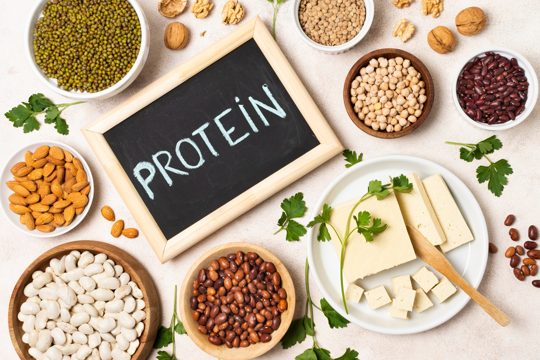
Obesity and being overweight are known to exacerbate many health issues, especially as we age. By adopting a high-protein, low-calorie diet, you can effectively manage your weight, thereby reducing the risk of developing obesity-related health conditions and improving your overall health.
Additionally, it's worth noting that this diet plan isn't about just cutting calories; it's about making your calories work for you. Protein-rich foods tend to be more satiating, meaning you'll feel fuller longer, reducing the likelihood of overeating. Furthermore, a high-protein diet can also help stabilize blood sugar levels, improve bone health, and enhance the body's ability to heal and repair. Therefore, with the right approach and guidance, this diet can become a sustainable and beneficial part of your lifestyle, promoting long-term health and vitality.
The Role of Protein
Protein plays a crucial role in maintaining muscle mass in older adults. It aids in the repair and growth of muscles, which can slow the progression of sarcopenia.
The recommended daily protein intake for seniors is 1. 0 to 1. 2 grams per kilogram of body weight. Protein, nature's building block, performs a significant function in the lives of older adults, especially when it comes to preserving their muscle mass. This integral nutrient acts not just as a maintenance tool, but also as a repair and growth agent for muscles. As we age, our muscle mass naturally decreases due to a condition known as sarcopenia. However, consuming adequate protein can act as a shield, slowing down the rapid progression of this condition, and thereby enhancing the quality of life for seniors.

The recommended daily protein intake for seniors is 1. 0 to 1.
2 grams per kilogram of body weight, a guideline set to ensure optimum health. This isn't just an arbitrary number, but a carefully calculated suggestion based on numerous scientific studies and research. Ensuring this level of protein intake can be a game-changer for seniors, as it can contribute to increased strength, better mobility, and overall improved health. However, it's essential to remember that each individual's needs can vary depending on factors like activity level, health status, and body composition. Therefore, while this recommendation serves as a good starting point, a personalized approach is always best when it comes to nutrition. To sum up, protein is a powerful nutrient that can support older adults in their journey towards better health and wellbeing, making it a key component of their daily diet.
Importance of Low-Calorie Foods
While protein is essential, its equally important to limit calorie intake. Obesity is a common issue among older adults and can lead to various health problems.
A low-calorie diet can help manage weight and prevent obesity-related diseases. Although the importance of protein cannot be underestimated in maintaining a balanced diet, it's crucial to note that its consumption should be regulated alongside a conscious effort to limit overall calorie intake. The significance of this practice particularly shines through when considering the escalating issue of obesity, a health crisis that has become alarmingly common among older adults. This condition, if not managed properly, can open the floodgates to a myriad of other health complications that could potentially compromise the quality of life and well-being of those affected. In this regard, adopting a low-calorie diet can serve as a potent weapon. Lower calorie diets, when combined with regular physical activity, can help to maintain a healthy weight, thereby reducing the risks associated with obesity.
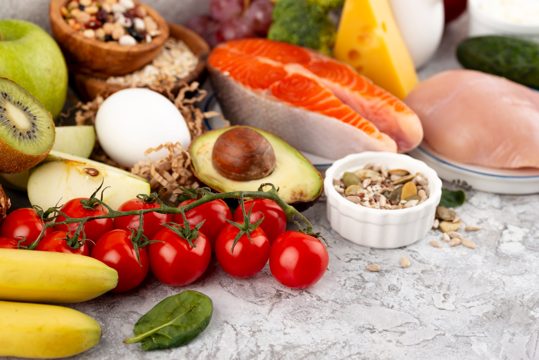
These dietary adjustments not only aid in weight management but also contribute to the prevention of obesity-related diseases. A balanced diet plays a vital role in overall health, and by making conscious choices about our food intake, we can positively influence our health outcomes.
In conclusion, while the intake of essential nutrients like protein is irrefutably important, it's equally pivotal to keep a vigilant eye on our calorie intake. Remember, the key to a healthier life isn't just about what we eat, but also about how much we eat. In the ongoing battle against obesity and its related health challenges, a balanced, low-calorie diet could very well be your secret weapon. Harness its power to effectively manage weight and stave off potential health problems.
Targeting Nutrient-Dense Foods
Targeting nutrient-dense foods is essential for older adults. These foods deliver high amounts of nutrients without adding excessive calories.
Fruits, vegetables, lean meats, whole grains, and low-fat dairy products are examples of nutrient-dense foods. Emphasizing the importance of targeting nutrient-dense foods is not just beneficial but downright essential for older adults. These powerhouse foods, packed with an impressive amount of nutrients, provide the body with a plethora of essential vitamins and minerals without the burden of adding excessive, unwanted calories. It's like having the best of both worlds - feeding your body with what it needs while maintaining a healthy weight. Examples of these nutrient-dense foods are as varied as they are delicious. Fruits, filled with natural sugars and fibers, not only satisfy your sweet tooth but also aid in digestion.

Vegetables, the unsung heroes of the food world, bursting with vitamins, minerals, and antioxidants, are vital for overall health and preventing diseases. Lean meats, which are excellent sources of protein, help in muscle development and strength, something especially important as we age.
Whole grains, often overlooked, are integral for heart health and maintaining a healthy digestive system. They are rich in fiber and other essential nutrients, making them a must in every diet. Low-fat dairy products provide the necessary calcium and vitamin D, essential for bone health and preventing osteoporosis. So, incorporating these nutrient-dense foods into your diet is not just a suggestion, it's an investment in your health and well-being. After all, it's not just about adding years to your life, but life to your years.
Avoiding Empty Calories
Its essential for seniors to avoid empty calories, which come from foods and drinks that provide energy but little nutritional value. These include items such as sugary drinks, desserts, and processed foods.
Understanding the importance of dietary habits in maintaining overall health, it becomes essential, especially for seniors, to be conscious of their nutrition intake. Empty calories, a term that may sound rather obscure, refers to the calories derived from foods and drinks that offer substantial energy but little to no nutritional value. These are the silent culprits in many diets that contribute to health problems without offering any significant benefits. They hide in the most tempting and often consumed items in our diets such as sugary drinks, mouth-watering desserts, and convenient processed foods. Sugary drinks, for instance, are a common source of empty calories. These beverages, often loaded with high fructose corn syrup, provide quick energy but are bereft of essential nutrients like vitamins and minerals. Similarly, desserts, while satisfying our sweet tooth, are also high in sugars and fats but low in nutritional value.

They may make our taste buds dance with joy, but they contribute minimally to our body's nutrient requirement. Processed foods are another major source of empty calories.
While they offer the comfort of quick, effortless meals, they are often heavily loaded with unhealthy fats, sugars, and sodium. The processing strips them of their natural nutrients, leaving behind a calorie-dense but nutritionally poor food item. In essence, seniors need to be wary of these empty calories. They should strive to maintain a balanced diet, filled with nutrient-rich foods, to ensure they receive the energy they need without compromising on the nutritional value. By focusing on foods that provide both energy and important nutrients, seniors can significantly enhance their health and wellbeing. This isn't just a dietary recommendation, but a lifestyle choice aimed at increasing their quality of life.
The Importance of Hydration
Hydration is crucial at any age, but it becomes even more important for seniors. Dehydration can lead to various health issues, so its essential to drink plenty of fluids throughout the day.
Hydration, the fundamental act of replenishing our body's water content, is undeniably crucial at any age. However, it gathers an increased significance for our senior citizens. As the years progress, our bodies naturally undergo changes that make them more susceptible to dehydration. This could lead to an array of troublesome health issues that can severely affect their quality of life. It's not just about quenching your thirst, it's about maintaining the balance of bodily fluids that aid in digestion, absorption, circulation, creation of saliva, transportation of nutrients, and maintenance of body temperature. Dehydration can be a silent intruder, often going unnoticed until more serious symptoms arise.
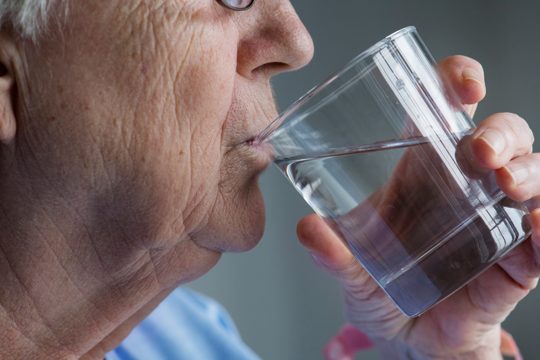
It can lead to urinary and kidney problems, seizures due to electrolyte imbalance, and even heat injuries due to increased body temperature. It can also cause physical and mental fatigue, making daily tasks more challenging.
Therefore, it's absolutely essential that seniors, and those who care for them, make a conscious effort to ensure they are drinking plenty of fluids throughout the day. This is not limited to just water, but can include other hydrating liquids like herbal tea, fruit juices, soups, or even water-rich fruits and vegetables. Remember, staying hydrated is not just about preventing health issues, it's about promoting overall wellness, vitality, and longevity. So let's make hydration a priority and support our seniors in maintaining a healthy and active lifestyle.
Dietary Fiber for Digestive Health
Dietary fiber is important for maintaining a healthy digestive system. It can help to prevent constipation, a common issue among older adults.
Foods high in fiber include fruits, vegetables, whole grains, and legumes. Indeed, dietary fiber, often considered the unsung hero of our daily diet, plays a paramount role in fostering a healthy and robust digestive system. This wonderful nutrient not only aids in the efficient processing of foods but also acts as a natural guard against various digestive problems. One such issue is constipation, a discomfort that is particularly prevalent among older adults. By including sufficient fiber in your diet, you can ensure a smooth and regular bowel movement, thereby keeping constipation at bay. But where do you find this beneficial nutrient? Well, nature has blessed us with a plethora of fiber-rich foods that are as delicious as they are nutritious. Fruits, brimming with sweetness and health, are an excellent source of dietary fiber. Whether it's a juicy apple or a succulent orange, fruits can be a tasty and fiber-filled addition to your diet.
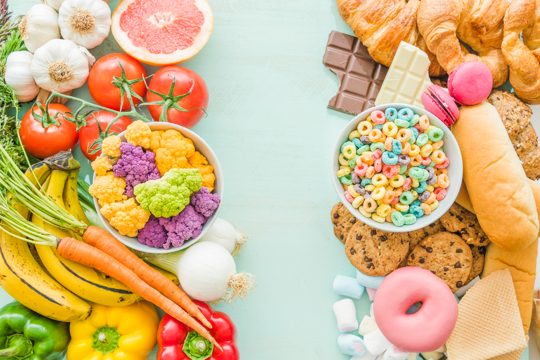
Vegetables, on the other hand, are packed with fiber and a host of other essential nutrients. From crunchy carrots to leafy greens, incorporating a variety of vegetables in your meals can significantly increase your fiber intake.
Whole grains are another great source of dietary fiber. Foods like whole grain bread, brown rice, and oats are not only high in fiber but also provide sustained energy throughout the day. Swapping out refined grains for their whole counterparts can be a simple yet effective step towards a more fiber-rich diet. Lastly, legumes like beans, lentils, and peas are a powerhouse of fiber. They are versatile and can be included in a wide range of dishes, making them an easy and efficient way to boost your dietary fiber intake. In conclusion, by integrating these fiber-rich foods into your everyday meals, you can enjoy a well-functioning digestive system and potentially evade common digestive issues like constipation. So, make the most of these natural delights and let your body reap the benefits of a high-fiber diet.
Vitamins and Minerals for Bone Health
Older adults should focus on getting enough vitamins and minerals, particularly calcium and vitamin D, to maintain bone health. Dairy products, leafy green vegetables, and fortified foods can provide these important nutrients.
It's crucial for older adults to pay special attention to their dietary intake, ensuring they receive an adequate amount of vitamins and minerals to support their overall health. Two nutrients that should be high on their priority list include calcium and vitamin D, which play an instrumental role in maintaining robust bone health. As we age, our bone density naturally decreases, which can lead to conditions like osteoporosis. Therefore, incorporating calcium-rich foods into our diet can help counteract these changes. Foods such as dairy products, including cheese, yogurt, and milk, not only offer a delicious way to supplement your calcium intake but also provide other essential nutrients beneficial for health. Similarly, vitamin D is another vital nutrient that aids in the absorption of calcium and boosts bone health.

While sunlight is a natural source of vitamin D, it's not always easy to get enough, especially during winter months. This is where fortified foods come into play.
Foods fortified with vitamin D, like certain types of bread, cereals, and orange juice, can help fill the gap and ensure you receive adequate amounts daily. Furthermore, don't forget about leafy green vegetables. Spinach, kale, and broccoli are not only packed with calcium, but they also offer a plethora of other nutrients, such as fiber, vitamin C, and antioxidants, which contribute to overall well-being. So, remember, maintaining a balanced diet that includes a variety of these nutrient-dense foods can significantly contribute to preserving bone health as you age. It's not just about adding years to your life, but adding life to your years.
The Role of Healthy Fats
Healthy fats play a crucial role in senior nutrition. They support brain function and heart health.
Foods like avocados, fatty fish, nuts, and seeds are good sources of healthy fats. Indeed, healthy fats are not just important, but absolutely indispensable when it comes to senior nutrition. Forming an integral part of a balanced diet, these nutritional powerhouses are key in maintaining the overall well-being of seniors. They play a pivotal role in supporting brain function, ensuring that cognitive abilities remain sharp, and memory retention stays robust. This is especially important as we age, as it promotes mental agility and reduces the risk of cognitive decline. Moreover, these fats contribute significantly to heart health. They aid in reducing levels of "bad" LDL cholesterol while increasing "good" HDL cholesterol, thereby striking a balance that is essential for cardiovascular health.
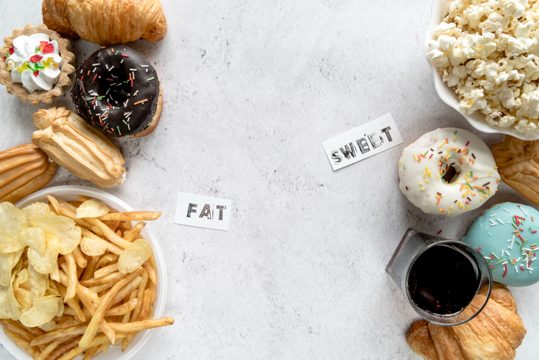
This can potentially lower the risk of heart disease which is one of the leading causes of mortality among seniors. Now, you might be wondering, where can we find these so-called healthy fats? Look no further than common, everyday foods that are not just nutritious, but also delicious.
Avocados, for instance, are a great source. Not only are they creamy and versatile, but they're packed with monounsaturated fats and fiber. Fatty fish, like salmon and mackerel, are rich in omega-3 fatty acids, which are known for their heart-healthy benefits. Nuts and seeds, too, are nutritional powerhouses, boasting a good amount of these beneficial fats, along with fiber, protein, and a variety of vitamins and minerals. Including these foods in your diet can not only boost your health but also add a lot of flavor and variety to your meals. So, remember, when it comes to senior nutrition, don't shy away from fats. Embrace the right kinds, and your body will thank you for it!.
The Importance of Regular Exercise
Alongside a healthy diet, regular exercise is crucial for seniors. It can help to maintain muscle mass, improve balance and coordination, and promote overall health and well-being.
Its always best to consult with a healthcare professional before starting any new exercise regime. In conjunction with a nutritious and well-balanced diet, consistent physical activity plays a pivotal role in the health and wellness of seniors. Engaging in regular exercise does more than just keep one active; it acts as a cornerstone of a healthy lifestyle, aiding in the preservation of muscle mass, which naturally tends to decline with age. Additionally, it offers improved balance and coordination, a key factor in preventing falls and potential injuries that can occur in the later stages of life. Exercise also encourages overall health and well-being, contributing to physical vitality and mental alertness, creating a positive impact on mood and cognitive function. However, it is paramount to remember that every individual's health condition is unique.

Therefore, it is always advisable to consult with a healthcare professional before embarking on a new exercise regimen. This ensures that the chosen activities align with one's current health status and capabilities, minimizing any potential risk of injury.
Healthcare professionals can provide personalized recommendations and guidelines, making the transition to a more active lifestyle safer and more manageable. So, while the concept of regular exercise may seem daunting at first, remember that even small steps can lead to significant changes. Whether it's taking a leisurely walk in the park, participating in a senior-friendly yoga class, or even doing light stretches at home, every bit of physical activity counts. Maintain a positive attitude, stay consistent, and soon, you will reap the rewards of a healthier, more active lifestyle.
About us
Welcome to SeniorCaresHub! Welcome to our comprehensive senior care destination! We pride ourselves on being a trusted resource for all things related to caring for aging loved ones. We understand the unique needs and challenges that come with senior care, and our mission is to provide you with the information, resources, and support you need to confidently navigate this journey and help you provide the best possible care for your aging loved one.

